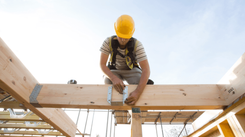New Construction Inspection: Why New Homes Need an Inspection


by Tyler Forte
Newly constructed homes are exciting for homeowners around the country. When you begin a new construction project, you get to watch a home designed to your specifications built before your eyes. But while you might expect your brand new home to be perfect from the get-go, it may have issues that require immediate attention.
It's important to order a new construction home inspection before move-in. We'll look at the importance of new home inspections and what you should expect when hiring a licensed inspector to assess your new home.
What Is A Home Inspection?
A home inspection is a process in which a qualified, licensed home inspector checks a real estate property's condition and writes an inspection report of their findings. The inspector examines the HVAC, electrical, plumbing, water, sewage, roof, and much more.
In other words, an inspection is a final check to ensure that homeowners receive the property in as close to perfect condition as possible.
Why Should You Get An Inspection On A Brand New House?

It's always a good idea to get an inspection on a brand-new house before you close. For all their luster and appeal, new homes often end up with mistakes due to the construction process. These issues may cause major headaches for homeowners later down the road if not caught early.
No home is perfect
No newly constructed house is perfect regardless of the skills of its builders. Even the best construction company makes mistakes from time to time. And unfortunately, some construction companies cut corners to finish a home on time or under budget. Home inspections help catch residual issues from the building process.
Building codes don't include everything
Though skilled contractors build homes according to code, building codes don't always account for every safety standard or ensure perfection. Home inspections ensure that new homes follow local building codes to minimize potential safety issues.
Many different crews worked on your house

Depending on the home and its construction process, several crews might have worked on it during the construction process. This introduces the potential for miscommunications, missed issues or safety problems, and more. Building inspections often catch such problems before they become truly dangerous or significant.
Benefits Of A Home Inspection
Home inspections provide many important benefits to new homeowners. These benefits include:
- Protection from "buyer's remorse," in which homeowners regret purchasing a new build.
- Approval for homeowners insurance. Some mortgage lenders require home inspections before loan approval in most cases. Most insurance companies also require four-point home inspections on new homes.
- Increased leverage for price negotiations. When buying a new home, a home inspection may allow home buyers to negotiate a lower price if they find defects that they have to pay for later.
- Increased savings in the future. By finding problems early, homeowners can repair them sooner rather than later, avoiding further damage or structural degradation.
- Peace of mind. Home inspections guarantee homeowners aren't surprised by any glaring issues when they move into a newly constructed property.
Private Home Inspector vs. Building Code Inspectors
Local or municipal building code inspectors are required to check new homes. These individuals are not the same as private home inspectors.
Building inspectors work for local cities or municipalities. They ensure that new houses adhere to local building codes.
On the other hand, private home inspectors are contractors that provide comprehensive inspection services, including in-depth examinations of residential properties. Then they provide homeowners with professional opinions about the house's condition, possible issues, and more.
If a building code inspector has already checked your new house, schedule a private home inspection before purchasing the home.
How Do You Find A Reputable Home Inspector?
Future homeowners should find reliable, reputable home inspectors for their newly-purchased properties. Reputable home inspectors offer thorough, professional work. Reputable inspectors are less likely to miss building issues that may lead to increased costs later.
To find a quality home inspector, check home inspector review sites like Yelp, Angie's List, Home Advisor, and more. Homeowners should also check any inspector's business page on social media platforms for reviews, previous customer testimonials, and a general sense of their work quality. Your Realtor is also an excellent source for finding qualified home inspectors.
Does a home inspector need to have a license?
It depends on the state. Some states, such as Nevada, Texas, Ohio, and New York, have home inspector licensure requirements. (Others do not.) Homeowners should review their state's licensure requirements before beginning their hunt for a trustworthy home inspector.
Types Of Home Inspection For A New House
Home inspectors can perform different types of home inspections for new houses. We'll walk through a few of the most common and important inspections you should order for a new home.
Foundation inspection

A foundation inspection checks the foundation of a new house for signs of degradation, stability, or issues with the soil surrounding the property. Such assessments help prevent long-term house damage, such as sloping foundations or cracks beneath a property. Some homebuyers also opt to have a pre-pour inspection to minimize issues with grading or other lot issues before the builder pours the foundation.
Framing inspection
Framing inspections investigate the wooden framing of newly constructed houses. Framing inspectors should visit the site for a review during the construction process and once the home is mostly finished. Inspectors also perform framing inspections after other checks of critical systems like electrical, plumbing, and mechanical systems. This is commonly known as a pre-drywall inspection.
Blue-tape inspection

Inspectors perform blue-tape inspections close to the end of a new house's construction. The future homeowner, Realtor, and lead contractor perform a final walk-through of the property. During the walk-through, the homeowner, Realtor – or the professional inspector they bring with them – uses "blue tape" or any other marking tool to identify issues. The problematic items combine into a punch list that the builder corrects before move-in.
Final inspection
Final inspections are the last inspections performed before move-in. Future homeowners walk through their new home during these inspections and mark more problems if they see them, such as electrical outlets that don't work.
Termite inspection
Termite inspections are valuable for new houses constructed in areas known for termite infestations. Licensed contractors check for signs of termites burrowing into walls or floors. Identifying infestations early allows pest removers to come in, deal with the infestation, and prevent further damage before homeowners move into the property.
Radon inspection
Radon inspections check for the potentially toxic gas radon in newly constructed properties. Inspectors should perform radon checks before occupancy to avoid medical issues. New homeowners should order radon inspections even if their new properties have radon-resistant features.
Another home inspection before the 1-year warranty deadline
New homeowners should consider ordering another professional home inspection before the one-year warranty deadline for their new property expires. Most new homes come with a one-year builder warranty that covers the repairs for maintenance or safety issues caused due to building issues that arise. A new house during its first year will settle slightly, and the materials such as the wood frame will lose moisture during the freeze and that cycle. This is entirely normal, but you want to check for these issues before your warranty expires.
For the best results, new homeowners should hire the same professional inspector they used previously to perform another check before the one-year warranty is up. The inspector can create an independent, professional report, lowering the likelihood of arguments or contested claims about house problems. Mark your warranty inspection on your calendar as soon as you close.
Common Issues Found In Home Inspections
New homeowners need to prepare for potential issues an inspector might find during the typical inspection process. Due to poor workmanship, contractor negligence, building too quickly, or other factors, new properties might have some of the common problems listed below.
Structural or foundation problems

The structure or foundation of the house is vital. The foundation affects the stability and evenness of the house. Common structural and foundation problems include:
- Damaged framing
- Crooked or cracked walls
- Cracks in the foundation from settlement or soil problems
- Uneven flooring or roofs
Grading
Some home inspections identify grading issues. Grading issues occur when water pools around a property rather than flowing away from the house. Poor grading can harm the structure or affect the foundation.

Grading issues may include:
- Water pooling
- Leaks in the basement or crawlspace
- Puddles in the yard or area around the house
Windows and doors
A new house's windows and doors might have problems discovered by a licensed inspector. These problems can include:
- Foggy windows due to broken or improperly fitted thermal seals
- Window and door leaks
- Windows and doors that don't open or close easily
- Broken windows or doors due to settling
- Other manufacturer defects in windows and doors
Mechanical components: HVAC, electrical, and more
New home inspections may uncover problems with a house's mechanical components and systems, such as heating and cooling systems or electrical wiring. Common problems include:
- Inefficient heating or air-conditioning systems
- Inadequate vents for gas furnaces
- Water leaks
- Dud electrical outlets
- Missing ground fault circuits
- Missing electrical implements or light fixtures
Plumbing
Due to rushed construction or contractor mistakes, new houses could have inadequate plumbing systems. Commonly revealed plumbing problems in new homes include:
- Leaky faucets in the kitchen and bathrooms
- Reversed hot and cold water lines
- Water leaks in either or both drain and supply pipes
- No stop blocks in gas water heaters located in garages
- Inadequate vents for gas tanks or tankless water heaters
Roofing

Inspectors sometimes find serious issues with the roofs of newly constructed houses. Roofing problems often include:
- Improperly installed roofing materials
- Low quality or damaged shingles that don't adequately protect from leaks
- Improperly installed gutters or drip edge flashings
- Exposed nail heads on roofs or ridge vents
Paint
Paint affects the home's aesthetic and curb appeal. Sometimes home inspectors find issues with new house paint inside or outside. These issues include:
- Poorly applied paint
- Not enough layers of paint
- Bad coloring or fading due to poor quality paint
- Paint dripping down the walls
Exterior finishes
New houses may have serious exterior siding installation problems depending on the materials. Home inspectors check house sidings for signs of damage or weakness. Potential problems include:
- Lack of sealant around windows for stone veneer siding
- Cracks or holes in vinyl or wood siding
- Loose panels for vinyl siding
- No sealant around trim boards for fiber cement siding
- Peeling stucco finishes for stucco siding
- Cracks in mortar joints or improper sloping around ledges for brick veneer siding
Chimneys and fireplaces
New houses with chimneys and fireplaces must have these areas inspected to avoid long-term problems with insulation and smoke. Inspectors may find problems with chimneys and fireplaces, including:
- Blockage in the chimney or fireplace
- Vents are hard to move or manipulate
- Poor chimney stability/durability
Attic and insulation
Every house needs adequate insulation to stay properly hot or cool. A home's attic must be well-designed and properly insulated to avoid energy efficiency issues and prevent pests. A home inspector may find issues like:
- Unfinished attic insulation, which should have blown fiberglass installation rated at R30 or R60 depending on the state
- Issues with exterior wall insulation, which require a minimum R13 insulation value
- Problems with insulation in crawlspaces or basements
Flooring
A home's floor affects its comfort, cleanliness, and overall value. Home inspectors could find issues with home flooring like:
- Uneven tiles in laundry rooms, kitchens, and bathrooms
- Missing or cracked grout between floor tiles
- Overly tight wood laminate flooring, which may cause warping or bowing
- Wood floor warping, squeaking, or cracking
- Scratches and similar surface damage to hardwood floors
- Bad carpet seaming/installation
Walls
The home inspector will examine a home's walls for insulation problems and overall stability. Home inspectors could find issues like:
- Cracks in the walls or drywall
- Issues with window sealant
- Warped walls due to structural or foundational issues
- Lack of adequate insulation for cold winter weather
Basement and crawlspace

If a new home has a crawlspace or basement, the inspector will check for problems such as:
- Lack of foundation vents
- Loose HVAC ductwork
- Poorly or never installed plumbing waste pipes and supply pipes
- Water leaks or penetration
- Installation of a vapor barrier
Kitchen
Licensed inspectors should also check new home kitchens. Kitchen problems can include:
- Leaking or poorly performing faucets
- Broken or malfunctioning dishwashers
- Poorly installed cabinets or shelving
- Bad or malfunctioning light fixtures
- Bad or malfunctioning stove tops or ovens
What Is Not Covered In A Home Inspection?
While comprehensive home inspections are beneficial, they don't cover everything. Most typical home inspections do not cover:
- Pest control services. Some professionals don't check for specific pests. It’s important to hire a pest control company to conduct a separate termite inspection.
- Swimming pool inspections
- Checks for toxins like asbestos
- Indoor air quality
- Lead paint checks
- Septic tank inspections
Homeowners may need to contact specialized inspectors if their new properties include these elements or risks.
Will The Builder Fix Issues That Arise In A Home Inspection?
Builders are legally required to fix issues that arise in a home inspection if those problems are due to manufacturing or construction mistakes. Builders must also fix problems that impact the house's final form as ordered in the contract. After all, a new house builder is on the hook to deliver the house as promised.
Home inspection contingency
In a nutshell, a home inspection contingency is a special clause in a builder’s purchase contract. It gives the buyer or future homeowner the right to have the home inspected within a specific timeframe. The homebuyer can then negotiate repairs with the builder or cancel the contract if the builder refuses to perform them.
Will The Builder Fix Issues That Arise After Closing?
Yes, but only if the contract includes a home warranty. That's why it's vital for owners of new houses to order second inspections close to one year after move-in, just in case some ongoing issues require repairs.
Negotiate a home warranty
All home builders offer a one-year home warranty at a minimum. New homeowners should review their warranty documents and plan accordingly.
Read the builder manual

Many home contractors give homeowners builder manuals. Builder manuals break down how to operate the circuit breaker board, use appliances, and similar instructions. Homeowners who've moved into a new property should read their builder manuals when identifying and potentially fixing problems.
Reach out to the builder
Once they identify an issue, homeowners should reach out to the builder and place a repair order. Most builders ask for details before coming out to perform the repairs.
Use your home warranty
New homeowners should not forget to utilize their home warranties. These can save homeowners significantly, as some repairs or fixes can be costly.
Felix Is By Your Side Every Step Of The Way
As you can see, there's a lot to consider when ordering a new construction inspection. But before you can worry about making sure your property is up to your specifications, you need to find the right new build for your needs.
Felix can help! Our real estate brokerage specializes in new construction and existing home sales throughout Middle Tennessee. We're well equipped and able to help you find the home of your dreams in no time.
Sign up for Felix to search for homes in Middle Tennessee. We’ll walk you through each step of the home buying process.
About Felix Homes
Felix Homes is where five-star service meets low commissions! To date, we've saved our clients $1,610,738 in commission fees and have earned 120 five-star reviews on Google!
How are we able to offer five-star service AND lower commission fees? It's simple:
- We're an independently owned brokerage – not a franchise which allows us to keep more of the commission we earn.
- By offering a lower commission, more folks want to work with us which means we close more deals. By closing more deals, we can pass more savings along to our customers!
Still not convinced? Read all about our low-commission mission here.
If you have any questions about the state of the market or the home buying/selling process, please feel free to contact us at contact@felixhomes.com or 615-354-5731.




